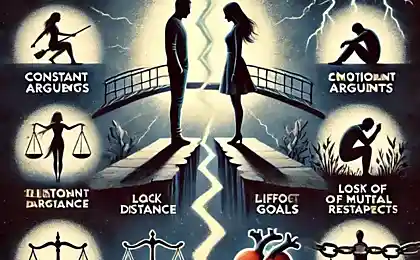450
To hate and to be angry — out to a standstill
What other way out of addiction may be, except "to hate and to become angry"? Harmful than hatred and resentment? How to do without them?
First of all, do not be lazy to repeat that exit through hatred do not seem to me out. It's the illusion of output, output to a standstill.
When I write that parents not be offended, but the former does not need to hate, I'm not sentimental in the care of parents and the former, I spit on them, and in the attempt to offer a more effective life strategy for those who offended.
For some reason, many angry with the Board not to be offended and to hate, like resentment and hatred gives them some buns that I want to take. Here they take offense at parents, and they from this is a profitable and satisfying, and here I am – do not be offended, and want it's useful to take. And hatred for the former as well. Immediately showered the argument that if the victim has suffered greatly, she has every right to hate. But the right should extend possibilities, and hate them significantly reduces.

How to regain your own? If it's taken away the property, you can go to court. It is true that the court is a difficult procedure, but in this sense, can help only a lawyer, not a psychologist. If it is about energy taken away (what is subjectively perceived as perceived humiliation and suffering), there is a Bank where you can have this energy to. Unfortunately, all the offended believe that to they can only the abuser and elsewhere. And so for a long time remain attached to him. Sometimes forever.
That is neither hate nor resentment does not help to break the attachment, they only help to change the emotional coloring of this attachment. In General, any strong emotion is a way to connect to something or someone, the merging of borders. In this sense, the psyche is similar to the amoeba that is trying to swallow something useful or to destroy something dangerous, and for this purpose covers. And emotions are the vibrations that help this amoeba isolate from reality all meaningful. Admiration, surprise, anger, delight – all of this causes the mind to draw maximum attention on some object and literally embrace him as their field to make an impression to embed this inside you. Even strong aversion, which should be to push, from the sense, still draws attention and makes a cast, there's an image for recording and research, then to avoid it, not closer.
Breaking ties is the indifference and complete ignore, neglect, turn off something from the field. Meanwhile, stored emotions, affective working channels, there is a connection and active exchange.

At first glance, it seems logical that something beloved that man was hugging his field, felt his part, the loss of trust and disappointment, you must first harder to hate, to reject from itself. It seems that hatred and anger – these are normal stages of separation, which are replacing the love and affection that attachment to adjourn. However, this perception is danger.
The first danger.
To hate what once loved is to allow his mind to react at all appealing to you as potentially dangerous. This creates suspicion and distrust, greatly limiting the possibilities. Inside people may feel that they have become more secure, but real security has nothing to do with chronic apprehension. Furthermore, even if alertness and protects against some of the harmful from the useful, it also protects.
The second danger.
By itself, the hatred is not separation, it is the sharp and painful experience of proximity with a hostile object. If the connection is interrupted, the hatred must stop, however, to interrupt the connection with the hated, but not yet destroyed the object from the point of view of psychophysiology is even more difficult than to break the bond with the beloved object. This idea seems paradoxical because, hating someone, we want to kill him, and fearing to go to prison or be killed if you try, quickly run away. It seems to us that this flight — good purpose of hate and without hate we would not have been able to escape. However, we're running away from the fear to kill, but hatred of him runs away with us, and this hatred will not allow to separate energetically. In thoughts, in emotions, in the mental field image of that person will remain until we hate him. Hatred binds to the image so much strongerthan love, since the mind first and foremost directs attention to the fact that it's dangerous for us, and only then that we nice and helpful. While I hate to get rid of and throw the person out of the field impossible.
But can we stop hating and become indifferent? To let go, as it is called. Of course. However, it is more difficult to make than if I had to let go of someone we don't hate. Loved to distinguish itself from easier (if you realize that he doesn't like) than the one whom we hate. At beloved we miss you physically, eager to see him, and with whom is associated the pain and hatred, do not want to see. Therefore, a feeling that hatred helps to separate your boundaries. Really hated object just moved to the us. Does this mean that we need to continue to love someone who is mistreating? Of course not! IMPOSSIBLE!In any case, you cannot reach to man, from intercourse with whom there is some harm.
Again, from the point of view of psychophysiology the field with the beloved is easier to do than with the hated object. It is important to convince ourselves that the person is closed to mutual exchange with him.
Of course, it is obvious that only one mental connection in my head is indispensable. It is necessary to separate physically, turn your attention to other resources, to start some kind of activity. Only then, gradually, the seat of addiction is something else, and energy is restored. If physically very difficult to break, but needs must arise a fear of an inadequate status, before guzzling addiction, front dual reality and his own madness, which can lead to dangerous situations. To experience fear and escape, do not have to experience the hatred of the man. It is enough to understand that there is something threatening, harmful, energy is lost and therefore, in this situation you need to go as quickly as possible.
But why do people not intuitively choose the path of separation of the borders and resort to hatred and resentment, if the first way is so effective and has no side effects?
This is due to the fact that the separation of their boundaries from someone who is significant, but is indifferent or bad to you, only with an internal locus of control.Internal locus of control is the feeling of their separateness from the world, a private independent values and subjectivity (hence the respect for his and others ' boundaries).

You connected with the world, but you're separately, you exist yourself, your I – inside you. So even if you're someone meaningful is not needed, you don't disappear if someone is bad to you, you stay the way you are, just cut off communication with those who do not want to properly communicate with you, thereby removed its significance. More does not change anything. If the locus is external, then I is outside of you, in those matters, or borders, in fact no, a private individual values and subjectivity is not the same.
Unfortunately, if with an internal locus of all the really bad, to convince the person not to be offended by parents or not to hate the person who bad acted with him, almost impossible. Therefore, all these arguments are meaningful only for those not offended and hates you, who is able to share the border and to cut ties, or almost learned how to do it, that is, for those who have an internal locus is already working, and our own subjectivity is already there. published
Author: Marina Komissarova
Source: psychoalchemy.ru/nenavist-obida/
First of all, do not be lazy to repeat that exit through hatred do not seem to me out. It's the illusion of output, output to a standstill.
When I write that parents not be offended, but the former does not need to hate, I'm not sentimental in the care of parents and the former, I spit on them, and in the attempt to offer a more effective life strategy for those who offended.
For some reason, many angry with the Board not to be offended and to hate, like resentment and hatred gives them some buns that I want to take. Here they take offense at parents, and they from this is a profitable and satisfying, and here I am – do not be offended, and want it's useful to take. And hatred for the former as well. Immediately showered the argument that if the victim has suffered greatly, she has every right to hate. But the right should extend possibilities, and hate them significantly reduces.

How to regain your own? If it's taken away the property, you can go to court. It is true that the court is a difficult procedure, but in this sense, can help only a lawyer, not a psychologist. If it is about energy taken away (what is subjectively perceived as perceived humiliation and suffering), there is a Bank where you can have this energy to. Unfortunately, all the offended believe that to they can only the abuser and elsewhere. And so for a long time remain attached to him. Sometimes forever.
That is neither hate nor resentment does not help to break the attachment, they only help to change the emotional coloring of this attachment. In General, any strong emotion is a way to connect to something or someone, the merging of borders. In this sense, the psyche is similar to the amoeba that is trying to swallow something useful or to destroy something dangerous, and for this purpose covers. And emotions are the vibrations that help this amoeba isolate from reality all meaningful. Admiration, surprise, anger, delight – all of this causes the mind to draw maximum attention on some object and literally embrace him as their field to make an impression to embed this inside you. Even strong aversion, which should be to push, from the sense, still draws attention and makes a cast, there's an image for recording and research, then to avoid it, not closer.
Breaking ties is the indifference and complete ignore, neglect, turn off something from the field. Meanwhile, stored emotions, affective working channels, there is a connection and active exchange.

At first glance, it seems logical that something beloved that man was hugging his field, felt his part, the loss of trust and disappointment, you must first harder to hate, to reject from itself. It seems that hatred and anger – these are normal stages of separation, which are replacing the love and affection that attachment to adjourn. However, this perception is danger.
The first danger.
To hate what once loved is to allow his mind to react at all appealing to you as potentially dangerous. This creates suspicion and distrust, greatly limiting the possibilities. Inside people may feel that they have become more secure, but real security has nothing to do with chronic apprehension. Furthermore, even if alertness and protects against some of the harmful from the useful, it also protects.
The second danger.
By itself, the hatred is not separation, it is the sharp and painful experience of proximity with a hostile object. If the connection is interrupted, the hatred must stop, however, to interrupt the connection with the hated, but not yet destroyed the object from the point of view of psychophysiology is even more difficult than to break the bond with the beloved object. This idea seems paradoxical because, hating someone, we want to kill him, and fearing to go to prison or be killed if you try, quickly run away. It seems to us that this flight — good purpose of hate and without hate we would not have been able to escape. However, we're running away from the fear to kill, but hatred of him runs away with us, and this hatred will not allow to separate energetically. In thoughts, in emotions, in the mental field image of that person will remain until we hate him. Hatred binds to the image so much strongerthan love, since the mind first and foremost directs attention to the fact that it's dangerous for us, and only then that we nice and helpful. While I hate to get rid of and throw the person out of the field impossible.
But can we stop hating and become indifferent? To let go, as it is called. Of course. However, it is more difficult to make than if I had to let go of someone we don't hate. Loved to distinguish itself from easier (if you realize that he doesn't like) than the one whom we hate. At beloved we miss you physically, eager to see him, and with whom is associated the pain and hatred, do not want to see. Therefore, a feeling that hatred helps to separate your boundaries. Really hated object just moved to the us. Does this mean that we need to continue to love someone who is mistreating? Of course not! IMPOSSIBLE!In any case, you cannot reach to man, from intercourse with whom there is some harm.
Again, from the point of view of psychophysiology the field with the beloved is easier to do than with the hated object. It is important to convince ourselves that the person is closed to mutual exchange with him.
Of course, it is obvious that only one mental connection in my head is indispensable. It is necessary to separate physically, turn your attention to other resources, to start some kind of activity. Only then, gradually, the seat of addiction is something else, and energy is restored. If physically very difficult to break, but needs must arise a fear of an inadequate status, before guzzling addiction, front dual reality and his own madness, which can lead to dangerous situations. To experience fear and escape, do not have to experience the hatred of the man. It is enough to understand that there is something threatening, harmful, energy is lost and therefore, in this situation you need to go as quickly as possible.
But why do people not intuitively choose the path of separation of the borders and resort to hatred and resentment, if the first way is so effective and has no side effects?
This is due to the fact that the separation of their boundaries from someone who is significant, but is indifferent or bad to you, only with an internal locus of control.Internal locus of control is the feeling of their separateness from the world, a private independent values and subjectivity (hence the respect for his and others ' boundaries).

You connected with the world, but you're separately, you exist yourself, your I – inside you. So even if you're someone meaningful is not needed, you don't disappear if someone is bad to you, you stay the way you are, just cut off communication with those who do not want to properly communicate with you, thereby removed its significance. More does not change anything. If the locus is external, then I is outside of you, in those matters, or borders, in fact no, a private individual values and subjectivity is not the same.
Unfortunately, if with an internal locus of all the really bad, to convince the person not to be offended by parents or not to hate the person who bad acted with him, almost impossible. Therefore, all these arguments are meaningful only for those not offended and hates you, who is able to share the border and to cut ties, or almost learned how to do it, that is, for those who have an internal locus is already working, and our own subjectivity is already there. published
Author: Marina Komissarova
Source: psychoalchemy.ru/nenavist-obida/























